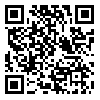BibTeX | RIS | EndNote | Medlars | ProCite | Reference Manager | RefWorks
Send citation to:
URL: http://ijmedicallaw.ir/article-1-95-en.html
Answering sophisticated ethical questions and issues is among the debates encountered by the psychologists in their daily activities. Most psychologists deal with the professional activity aiming at and wishing to help the persons under treatment and to promote their comfort and welfare. It may be said that the psychologists never want that the clients, students, colleagues and other persons working with them are inflicted with any damage intentionally but it will be an incorrect assumption if we think that any mistake would never happen and there is always the possibility of mistake in any profession and the psychology is no exception in this respect. When encountering with challenging cases, the psychologist often have no choice other than to take an ethical decision. Confusion, pressure, neutralization, indifference, concern, logical reasoning and reasonable conversation are among general reactions to the difficult cases that we observe them during professional activities. The professional law and ethics are the benchmarks for the wrongness and rightness of the acts and behaviors performed and/or avoided from by the members of the society the codification of the ethical codes is the guiding principles to proceed in this direction and the enactment of the laws and regulations governing on the subject explains the legal sanctions for them. Therefore, the prevailing order and discipline in the profession of psychology may be achieved by resorting to the legal rules and ethical standards. This paper has been written with the aim that the researchers make themselves acquainted with a knowledge and insight so that they may manage ethical shortages by a positive and constructive perspective and try for the welfare and comfort of their clients with complete sympathy and feeling of responsibility and have a humanistic behavior with them.
Received: 2011/11/22 | Accepted: 2012/01/25
| Rights and permissions | |
 |
This work is licensed under a Creative Commons Attribution-NonCommercial 4.0 International License. |





